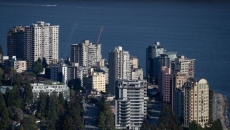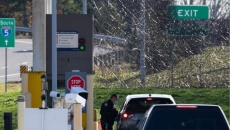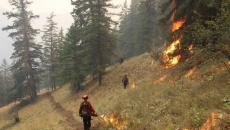A teepee and a sacred fire were set up in front of the Manitoba legislature on Monday to honour Murray Sinclair, as tributes poured in from across the country for the former judge, senator and chair of the Truth and Reconciliation Commission into residential schools.
People lined up under grey skies, facing a cold wind, to enter the teepee and pay respects. Flags nearby flew at half-mast.
Sinclair died in a Winnipeg hospital Monday morning. He was 73.
"I think we can truly say he was one of the key architects of the era of reconciliation," Premier Wab Kinew said.
"As we begin to mourn his loss ... I think we have to contend with the ultimate question of, now that we've been left to ourselves as Canadians, how are we going to take it from here?"
Murray Sinclair was a great Canadian, a great Manitoban, a great Anishinaabe.
— Wab Kinew (@WabKinew) November 4, 2024
His career stands as a legacy of public service and a deep commitment to truth, fairness and dignity for all people.
He was the first Indigenous person to be named to the Manitoba provincial court… pic.twitter.com/bmMfOmMZ7s
Canada has suffered a devastating loss. Murray Sinclair was a trailbazer who dedicated his life to truth and justice.
— David Eby (@Dave_Eby) November 4, 2024
A towering intellect with unassailable integrity.
My thoughts are with the Sinclair family.
He will be sorely missed.
Kinew joined Sinclair's family and community members in setting up the large teepee, which he said is an important part of Anishinaabe culture. Kinew had known Sinclair since the premier was a child.
"The sacred fire is a gathering place for mourners. And significantly, what it represents in our culture is the offerings that Murray will need in order to be successful on his four-day journey along the everlasting road to the afterlife."
Sinclair's family issued a statement and they invited people to visit the fire.
"Mazina Giizhik (the One Who Speaks of Pictures in the Sky) committed his life in service to the people: creating change, revealing truth, and leading with fairness throughout his career," said the statement, noting Sinclair's traditional Anishinaabe name.
Prime Minister Justin Trudeau paid tribute in Ottawa to Sinclair's work on reconciliation.
The Honourable Murray Sinclair dedicated his life to repairing Canada’s relationship with Indigenous Peoples. As the Chief Commissioner of the Truth and Reconciliation Commission, he challenged us to confront the darkest parts of our history — because he believed we could learn… pic.twitter.com/6MblQg9fTg
— Justin Trudeau (@JustinTrudeau) November 4, 2024
Born in 1951, Sinclair was raised on the former St. Peter's Indian Reserve north of Winnipeg. He was a member of Peguis First Nation.
He was raised by his grandparents and graduated from a high school in Selkirk, Man., where he excelled in athletics.
Some of his earliest childhood memories were published earlier this year in his memoir, “Who We Are: Four Questions for a Life and a Nation.”
In it, Sinclair described discrimination he experienced being Anishinaabe in a non-Indigenous school.
“While I and others succeeded in that system, it was not without cost to our own humanity and our sense of self-respect. These are the legacies all of us find ourselves in today.”
In 1979, Sinclair graduated law school at the University of Manitoba and later became the first Indigenous judge in Manitoba — the second in Canada.
He served as co-chair of the Aboriginal Justice Inquiry of Manitoba to examine whether the justice system was failing Indigenous people after the murder of Helen Betty Osborne and the police shooting death of J.J. Harper.
In leading the Truth and Reconciliation Commission, he participated in hundreds of hearings across Canada and heard testimony from thousands of residential school survivors.
The commissioners released their widely influential final report in 2015, which described what took place at the institutions as cultural genocide and included 94 calls to action.
“Education is the key to reconciliation,” Sinclair said. “Education got us into this mess and education will get us out of it.”
Two years later, he and the other commissioners received the Meritorious Service Cross for their work.
It was one of many recognitions Sinclair received over his career.
He was given a National Aboriginal Achievement Award, now the Indspire Awards, in the field of justice in 1994. In 2017, he received a lifetime achievement award from the organization.
In 2016, Sinclair was appointed to the Senate. He retired from that role in 2021.
The following year, he received the Order of Canada for dedicating his life to championing Indigenous Peoples' rights and freedoms.
In accepting that honour, Sinclair said he wanted to show the country that working on Indigenous issues requires a national effort.
"When I speak to young people, I always tell them that we all have a responsibility to do the best that we can and to be the best that we can be," he said.
Sinclair limited his public engagements in recent years due to declining health.
In his memoir, Sinclair described living with congestive heart failure. Nerve damage led to him relying on a wheelchair.
In his memoir, released in September, he continued to challenge Canadians to take action.
“We know that making things better will not happen overnight. It will take generations. That’s how the damage was created and that’s how the damage will be fixed,” Sinclair wrote.
“But if we agree on the objective of reconciliation, and agree to work together, the work we do today will immeasurably strengthen the social fabric of Canada tomorrow.”






